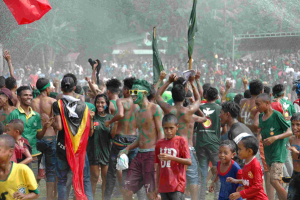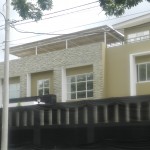Photo : New Mandala
Martial and ritual arts groups (MAGs) are mass membership organisations which play important roles in Timorese society and political culture. The emergence of KHUNTO as a key political player in the 2017 election surprised many, while alerting the public to the growing importance of MAGs in Timorese politics. Other MAG-affiliated political parties have since been established, such as the United Party for Development and Democracy (PUDD) and Os Verdes. At the same time, major political parties are coordinating with MAG leaders to mobilise popular support in various communities. This article builds on Fundasaun Mahein’s (FM) ongoing research into the politicization of MAGs – or the “MAG-ification” of politics – discussing some of its implications for the 2023 Parliamentary Election and for general security in Timor-Leste.
As popular, combat-oriented organisations with complex relationships with civil society, state institutions and resistance history, MAGs play a unique role in social and political life in Timor-Leste. MAG members emphasise that membership brings many benefits. For example, MAGs support their members economically by distributing work opportunities and assistance for family ceremonies. They also provide a space for fitness, camaraderie and group bonding. Many MAG members report joining for self-defence purposes, partly because state security forces seem unable to provide security in many areas of the country. Paradoxically, rival groups are frequently involved in violence against each other, which increases the perceived need to join MAGs for personal protection. However, most so-called “MAG violence” results from local disputes between individuals or families which escalate to the level of communal violence when the individuals involved call in their comrades as “back-up”. Nonetheless, FM has also heard reports of MAGs intimidating others based on political affiliation or as part of “mafia-style” extortion of small businesses.
Recently, established political parties have been making informal agreements with MAG leaders – and some politicians have become members themselves – because MAGs’ popular legitimacy within many communities is seen as useful for mobilising mass support. Often, many or all members of the same extended families or community belong to one MAG. At the same time, Timorese voters often support parties based on family or area affiliation rather than party policies. This means that local MAG leaders can instruct all their members in a given area to support a particular political party, and members then persuade their other family members to support the same party.
This relationship also brings advantages to MAG leaders, as supporting political parties is a useful way to gain economic benefits which can be distributed among key MAG members. The state is by far the largest source of jobs and money in Timor-Leste’s economy. As a result, access to government resources is one of the most powerful factors driving political activities and voting choices. It is therefore unsurprising that MAGs, as mass organisations with large support bases in both urban and rural areas, are also getting involved in the “game” of competing for state resources.
Although MAGs can provide various benefits at the individual and community levels, FM remains concerned that the increasing collaboration between MAGs and political parties – as well as the penetration of various state institutions by MAGs – may contribute to increased violence and socio-political instability. While the factors which trigger communal violence are extremely complex and varied, researchers have found increased risks for communal violence in contexts which combine legacies of past violence, powerful group identities, “youth bulge”, low education levels, fragile security sector governance and growing socio-economic inequality.
Many of these factors can be seen in Timor-Leste. For example, although some highly educated people participate in MAGs, many Timorese lack access to high quality education, including most MAG members. MAGs actively promote group loyalties and some even use blood oaths, while fiercely protecting their members from attacks by other groups. In addition, many government officials and members of the security forces are known to be MAG members, and members of security forces have sometimes facilitated or tolerated MAG violence. This country has a long history of communal violence and political instability, as well as daily violence which occurs across the country and growing political tensions and provocative statements by leaders. FM fears what could happen if MAG leaders “lose control” of some of their members at political events, let alone if leaders instruct members to commit violence against other groups.
On the other hand, while FM views the MAG-ification of politics and society as a national security risk, we do not believe that MAGs are the main “cause” of violence or instability in Timor-Leste. Indeed, as mentioned above, mass violence and armed conflict in this country has an extremely long history which long predates MAGs. Political violence and instability during the post-independence period is also nothing new: aside from the various crises we have faced since 2002, Timorese resistance leaders have continued to practice “guerrilla politics” until now, which is a source of constant tension and risk in our society. Disgruntled non-state groups have also adopted this approach by organising secretly and threatening violence if political demands are not met. In a similar way, MAG leaders’ political power is derived from their ability to gather mass support, organise (mostly) in secret and direct members to intimidate other groups or create instability.
One theory on why Timor-Leste’s political culture of clandestine, and often armed, resistance persists during the independence period is that that tensions between the UN state-building project and Timorese governance structures ensured that the “resistance” approach to politics persisted after independence. This may partly explain the gap between Timor-Leste’s formal state institutions and the informal realities of decision making at all levels. By its nature, clandestine resistance politics must use informal methods to achieve its aims. Nonetheless, Timor-Leste is a Democratic Republic based on the Rule of Law. Thus, politicians and state institutions must follow laws and formal rules, even though informal practices dominate decision making at the community level.
Furthermore, some politicians seek to blame MAGs for creating security problems and promoting corruption, but FM sees this as hypocritical. Major political parties are not only strengthening MAGs’ political role by using them to mobilise support, they have overseen the normalisation of patronage, nepotism and corruption. The Government’s failure to meet many Timorese people’s basic needs and provide basic security is also driving MAG membership and increased support for alternative parties such as KHUNTO, which promise to distribute resources directly to their members. Established parties have normalised patronage as a means of maintaining political support, so we cannot be surprised when MAGs also adopt this strategy. Meanwhile, government measures aimed at managing MAGs have so far failed to limit their growth or prevent violence. If socio-economic inequality continues to grow, so too will anger and resentment, while security conditions will continue to deteriorate around the country. Understandably, people will seek to join groups which can provide them with security, opportunities and meaning. MAGs will therefore continue to play an important role in Timor-Leste’s social, economic and political development.
Last year, FM called for an integrated strategy for addressing the issue of MAGs in Timor-Leste, the most important pillar of which is responding to the basic needs and concerns of ordinary Timorese people. FM has stated many times that we believe MAGs could be a force for good in Timorese society if overall conditions in the country improve significantly. However, if major parties continue down the unjust and unsustainable path of distributing benefits to politically-connected groups while neglecting the majority of people, we fear that MAGs may become vehicles for violence and further corruption of public resources.
These concerns are particularly relevant as we prepare for the 2023 Parliamentary Election, as the next Constitutional Government will determine the future of this country. The incoming Government must address the fundamental issues of economic growth, increasing state capacity, infrastructure and services if we are to avert a major financial and socio-political crisis.
For now, as we enter the election campaign period, FM simply asks all MAG leaders and political parties to refrain from using provocative and dangerous tactics such as attacking opponents, questioning their past credentials and inciting violence. Instead, political parties and MAGs must work together to promote peaceful and democratic political participation, while presenting realistic policies and programs which can address our people’s most urgent needs.





